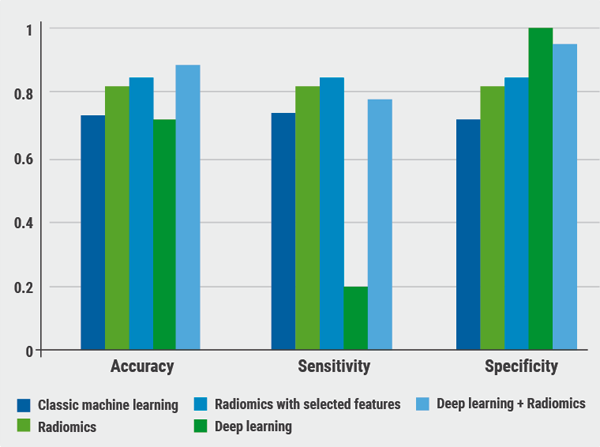The researchers used a cohort which consisted of 66 treatment-naïve patients with stage IV non-squamous NSCLC without EGFR/ALK/ROS1/BRAF-mutations. Patients were randomised to pembrolizumab monotherapy (n=31) and pembrolizumab + chemotherapy (n=36). At 9 weeks, pTMB was compared to Response Evaluation Criteria in Solid Tumors (RECIST) response and 6 months durable clinical benefit. High and low pTMB were defined at a cut-off of 16 mut/Mb [1].
The results showed that median progression-free survival in patients with high pTMB was 13.8 vs 4.7 months in patients who had low pTMB (HR 0.27, 95% CI 0.13-0.55, P0.001). In patients with high pTMB, median overall survival was not achieved compared to 8.4 months in patients harbouring low pTMB (HR 0.47, 95% CI 0.20-1.10, P=0.083).
It was concluded that it is feasible to assess pTMB in patients who receive first-line treatment (which included chemoimmunotherapy) for advanced NSCLC. Mutations in STK11/KEAP1/PTEN as well as ERBB2 seem to be able to predict a lack of clinical benefit of immunotherapy. However, they agreed that the role of pTMB needs to be validated in larger, prospective studies.
- Aggarwal C, et al. MA25.04. WCLC 2019.
Posted on
Previous Article
« Influence of age on disease progression Next Article
Tool to measure quality of life in MS »
« Influence of age on disease progression Next Article
Tool to measure quality of life in MS »
Table of Contents: WCLC 2019
Featured articles
Five-fold increase of OS at 5 years with nivolumab vs docetaxel
Screening, Detection, and Diagnosis
Non-Small-Cell Lung Cancer
Five-fold increase of OS at 5 years with nivolumab vs docetaxel
Promising phase 1 results of novel KRAS-inhibitor in NSCLC
Selpercatinib (LOXO-292) shows durable activity in RET fusion-positive lung cancer
Other Thoracic Malignancies
Immuno-Oncology
Nivolumab + ipilimumab safe first-line treatment for NSCLC patients with comorbidities
Targeted Therapy
Phase 3 Trial Updates
First-line pembrolizumab monotherapy offers durable OS benefit vs chemotherapy in NSCLC patients with high PD-L1 expression
Related Articles

November 8, 2019
New technologies in lung cancer detection
November 8, 2019
Durvalumab added to etoposide improves outcomes in ES-SCLC
© 2024 Medicom Medical Publishers. All rights reserved. Terms and Conditions | Privacy Policy

